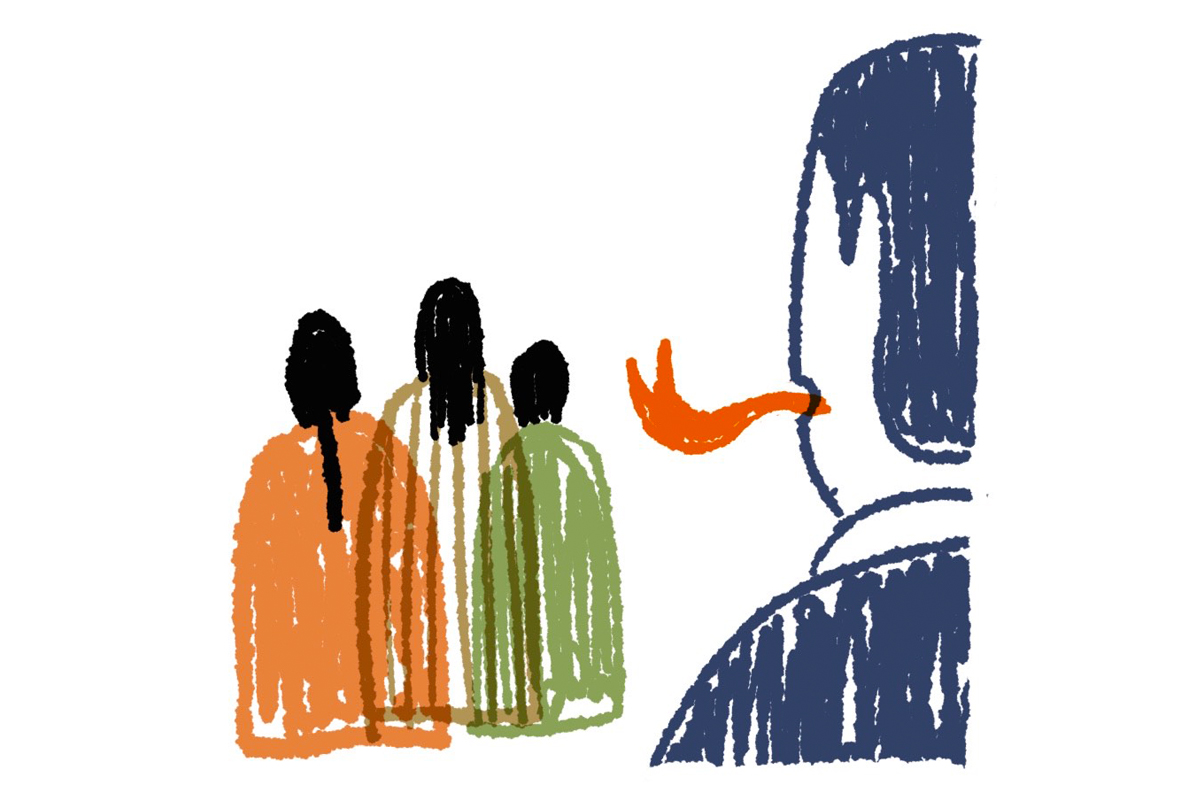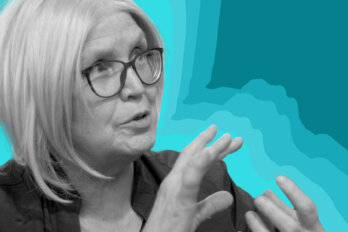
POLITICS / NOVEMBER 2024
Poilievre’s Idea of Reconciliation Is a Mess
But is that any different from Trudeau’s?
BY MICHELLE CYCA
ILLUSTRATION BY JAMIE BENNETT
Published 7:44, Sep. 18, 2024
On July 11, as Pierre Poilievre began his first in-person address to the Assembly of First Nations, a number of Indigenous delegates and veterans rose from their chairs and turned their backs to the leader of the Conservative Party of Canada. Their silent protest symbolizes the challenge Poilievre faces in trying to win over Indigenous communities, many of whom are concerned about what his leadership will mean for their nations.
With each change in federal leadership, the new government commits to resolving its fraught relationship with Indigenous people; for the past three decades or so, this process has largely been described as reconciliation. Justin Trudeau’s campaign for prime minister and almost ten years in office have been marked by unprecedented commitment to this process, in words if not always in action. Since his election in 2015, the gap between what Trudeau has pledged to do and what his government has accomplished has widened, to the frustration of Indigenous leaders and to the delight of his detractors. The majority of the ninety-four calls to action from the Truth and Reconciliation Commission have not been fully met, dozens of communities remain under long-term boil-water advisories, and the crisis of violence against Indigenous women and girls persists.
This past spring, the office of the auditor general reported that the dire housing conditions in First Nations communities had not meaningfully improved since 2015. Meanwhile, health inequities exacerbated by the toxic drug crisis and the COVID-19 pandemic have led to a decline in life expectancy; in BC and Alberta, the lifespan of First Nations people dropped by a staggering seven years between 2015 and 2021. (Poilievre has been a virulent critic of safe supply and promised to end some supervised consumption sites—which advocates say will lead to more deaths.)
Poilievre has seized on the mounting frustration with Trudeau’s unfulfilled ambitions to articulate the broad strokes of his own vision for reconciliation—one that echoes many of the same long-held positions of his opponent: Poilievre has promised to end water advisories on reserves, to fund searches for human remains at former residential school sites, and to abolish the Indian Act, which he has called a “racist, colonial hangover.” The Indian Act is universally considered a deeply flawed piece of legislation, but many Indigenous experts worry that a replacement would be worse and effectively extinguish Indigenous title and self-determination. “The political effect will be to convert these bands into a kind of ethnic Indigenous municipality—rather than self-determining nations,” writes Mohawk policy analyst Russ Diabo.
Poilievre is ascendant at a moment when federal promises to respect Indigenous sovereignty and engage in “nation-to-nation” relationships have been drowned out by a full-throated endorsement of “economic reconciliation” by parties across the political spectrum. Poilievre has championed oil and gas projects: “Remove the gatekeepers in Ottawa so First Nations can unlock more opportunity and paycheques for their people,” he posted on social media. Economic sustainability is crucial for Indigenous nations, but economic reconciliation is focused on marshalling Indigenous participation and support for extractive resource projects such as pipelines, which many Indigenous nations continue to oppose. The singular focus on economic reconciliation suggests that Poilievre’s government will selectively uphold the interests of cooperative Indigenous groups while dismissing the objections of others—not unlike what his predecessor has done.
But Poilievre remains dogged by a comment he made in 2008, when he suggested that compensation to residential school survivors was a waste. The comment, which was followed by a swift apology, can be read as a blunt summary of the logic underpinning economic reconciliation. “My view is that we need to engender the values of hard work and independence and self-reliance. That’s the solution in the long run—more money will not solve it,” Poilievre said in a radio interview shortly before then prime minister Stephen Harper issued a national public apology to survivors. Since then, in particular after he became party leader, Poilievre has developed a diplomatic approach, wearing an orange shirt and paying his respects on the National Day for Truth and Reconciliation. Many Indigenous leaders remain wary of both his intentions and his execution.
As Poilievre attempts to sell Indigenous people a vision of prosperity driven by resource industry partnerships, many are pointing to his poor record and critical statements on other issues with particular significance to Indigenous communities. After his speech to the Assembly of First Nations, he was rebuked by Kukpi7 Judy Wilson, former chief of Neskonlith Indian Band, for failing to acknowledge residential school survivors, missing and murdered Indigenous women, the climate crisis, or the United Nations Declaration on the Rights of Indigenous Peoples—Poilievre voted against legislation supporting the declaration in 2021. Duane Gastant’ Aucoin, one of the delegates who turned his back to Poilievre, said the Conservative leader’s statements on transgender rights constitute an attack on two-spirit people. And Poilievre’s well-established opposition to environmental protections and regulations will be felt by the Indigenous communities already grappling with disproportionate impacts from climate change, wildfires, and industrial contamination.
“We don’t want the legacies of successive governments to make outrageous promises that then aren’t kept,” Inuit Tapiriit Kanatami president Natan Obed told the Toronto Star in June. “I think that is the direct threat that reconciliation faces.” Under Poilievre, the greater threat could be promises kept.




